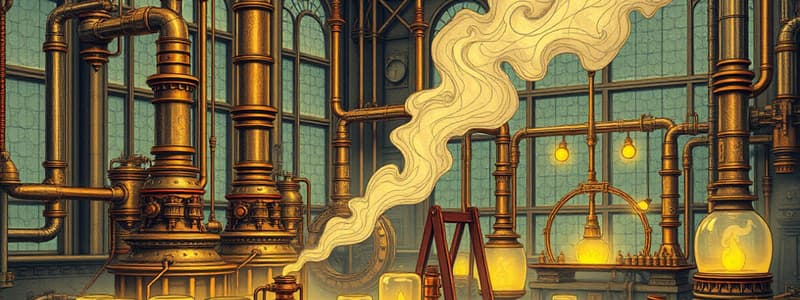Podcast
Questions and Answers
What distinguishes chemical engineers from other engineering professionals?
What distinguishes chemical engineers from other engineering professionals?
- They predominantly focus on electrical engineering concepts.
- They work exclusively on environmental issues without requiring math.
- They specialize solely in biotechnology.
- They apply principles of chemistry alongside math and physical sciences. (correct)
Which significant change in the production of industrial chemicals occurred during the Industrial Revolution?
Which significant change in the production of industrial chemicals occurred during the Industrial Revolution?
- Transition from continuous to batch processing.
- Introduction of new chemical regulations limiting production.
- A move from batch processing to continuous processing. (correct)
- Shift from manual labor to automated processes.
Which institution was one of the earliest to offer a course in chemical engineering?
Which institution was one of the earliest to offer a course in chemical engineering?
- Harvard University.
- University College London. (correct)
- California Institute of Technology.
- Stanford University.
Which of the following combinations is essential for chemical engineers to solve practical problems?
Which of the following combinations is essential for chemical engineers to solve practical problems?
What was a key focus of the curriculum change at MIT in 1888 regarding chemical engineering?
What was a key focus of the curriculum change at MIT in 1888 regarding chemical engineering?
What significant role did chemical engineers play in the development of plastics during the 1930s?
What significant role did chemical engineers play in the development of plastics during the 1930s?
Which of the following is a key contribution of chemical engineers to the medical field?
Which of the following is a key contribution of chemical engineers to the medical field?
What was a significant achievement of chemical engineers related to gases from air?
What was a significant achievement of chemical engineers related to gases from air?
How have chemical engineers contributed to environmental protection?
How have chemical engineers contributed to environmental protection?
Which of the following innovations in chemical engineering directly impacted the electronic age?
Which of the following innovations in chemical engineering directly impacted the electronic age?
Study Notes
Definition and Scope of Chemical Engineering
- Chemical engineering employs mathematics, physics, chemistry, biology, microbiology, biochemistry, and economics to tackle practical problems.
- It uniquely integrates chemistry with other engineering disciplines, making it versatile and applicable to various physical phenomena.
Historical Development of Chemical Engineering
- Prior to the 18th century, industrial chemicals were produced using batch processing methods.
- The Industrial Revolution (1700-1800) marked a significant transition from batch processing to continuous processing.
Evolution of Chemical Engineering Education
- 1882: University College London offered a course in "Chemical Technology".
- 1885: Central College (later Imperial College) introduced a course in "chemical engineering".
- 1888: Massachusetts Institute of Technology (MIT) launched Course X, focusing on a blend of mechanical engineering and chemistry applications.
Key Achievements in Chemical Engineering
- Crude Oil Processing: Developed techniques to crack long carbon molecules, yielding smaller hydrocarbons like ethylene and propylene.
- Plastics Development: Chemical engineers contributed to the creation of various plastics, including nylon and polyvinyl chloride (PVC), during the 1930s.
- Synthetic Fibers: Innovations in synthetic fibers began with rayon in 1910 and nylon in 1939, leading to applications in textiles and ultra-strong materials.
- Synthetic Rubber: Advances in creating synthetic rubber for various applications.
- Gaseous Separation: Pioneered methods to obtain purified oxygen and nitrogen from air.
- Semiconductor Fabrication: Assisted the growth of the electronics and computing industries.
- Medical Contributions: Collaborated with healthcare professionals to develop medicines and support medical technologies.
- Environmental Protection: Engaged in technologies aimed at pollution cleanup and prevention.
- Fertility and Pest Control: Helped produce essential fertilizers and pesticides for agriculture.
- Antibiotic Production: Developed mass production techniques for antibiotics, including penicillin since its discovery in 1929.
Grand Challenges in Chemical Engineering
- Make solar energy cost-effective.
- Develop methods for energy from nuclear fusion.
- Innovate carbon sequestration techniques.
- Ensure access to clean water globally.
- Advance health informatics systems.
- Engineer improved pharmaceuticals.
- Conduct reverse engineering of the human brain.
Professional Roles in Chemical Engineering
- Process development research.
- Technical sales of chemical products.
- Process engineering responsibilities.
- Design and construction of chemical plants.
- Environmental engineering initiatives.
- Fundamental research in chemical processes.
Core Principles of Chemical Engineering
- Material balances
- Thermodynamics
- Fluid mechanics
- Heat transfer
- Mass transfer
- Reaction engineering
- Separation processes
- Process control
- Materials science
- Economics
Studying That Suits You
Use AI to generate personalized quizzes and flashcards to suit your learning preferences.
Related Documents
Description
This quiz covers the fundamentals of chemical engineering as introduced in the AECH 1103 course. It explores the unique role of chemical engineers and their application of mathematics, physical sciences, and life sciences to solve practical problems. Test your knowledge on the integration of these disciplines in the field of engineering.




